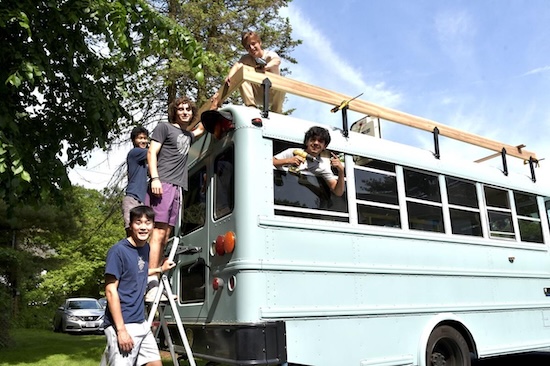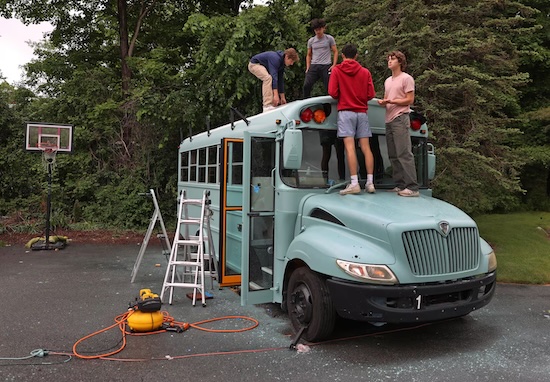
The Boys With the Bus, a group of Milton Academy high school seniors, blew up on the internet this summer after documenting their bus-camper conversion and cross-country travels on social media. After purchasing a decommissioned school bus for $7,000, they spent two months renovating the vehicle as part of a required senior project and spent many more months on the road, sleeping in Walmart parking lots and camping sites. The Argus sat down with members Sebastian Romero and Justin Chen to discuss the trip, renovation, social media presence, and isolation on the road.
The Argus: I read this all started as your high school’s senior design project.
Sebastian Romero: At Milton [Academy], every senior has to do a project. That could either be writing a book, doing a documentary, or doing an internship, but we chose to [pool] our summer money and buy this bus and renovate it. And at the start, the school [administration] was like, “This is kind of weird. I don’t know why you want to do this,” but we’d already bought the bus, so they couldn’t really say no to it.
A: Who came up with the idea? What was the pitch?
SR: Originally, there were 10 of us, our best friends from Milton, most we knew from middle school. It was a group effort, just kind of like spitballing, like, “Oh, what could we do? Let’s buy a bus.” “No, let’s renovate it.” And it just […] kind of escalated from there.
A: How much was the bus?
SR: The bus was only $7,000. We thought it would be way more because it’s a massive vehicle. Apparently, what winds up happening is that every 10 years, schools have to switch the buses they’re using for safety. There are a ton of buses just lying around for less than a used car.
A: So you bought it from an online auction?
SR: Facebook Marketplace.
A: Watching the videos, the renovation process seems totally legitimate. Did anyone come in with carpentry or mechanic experience?
Justin Chen: I mean, none of us really had many skills, let’s be real. We picked it up along the way—a lot of YouTube, a lot of trial and error. It’s really a miracle we didn’t kill ourselves in the beginning.
A: What did your parents think of all this?
JC: They’re pretty supportive overall. It’s not like we had anything else to do during that time. I think that it was a good learning experience. We learned a lot of school intellectual knowledge stuff, not a lot of handiwork [in high school]. [The renovation process] originally took about a month and then probably another to get it all done.
SR: It was kind of like a month to get everything except for plumbing and the roof deck and then another half a month to get plumbing.
A: Whose idea was the road trip?
JC: They were kind of synonymous. I mean, you don’t really renovate a bus without planning to actually travel in it. I think we hoped it would be longer, but with timing, we had so many people to go to places and go to college and stuff, so it ended up not being that long.
SR: We wanted it to be like a whole three months. And then it took longer to do the roof deck than we thought. I think we ended up doing two weeks on the first trip, and we went on three different trips. Two weeks was the first one with everyone, which was super sick.
A: Are you both on gap years? Was that always part of the plan?
SR: No.
JC: Originally, it was just a summer thing, but one of the five of us was super keen on taking the gap year. And then the rest of us were kind of like, “If there’s one reason to take a gap year, it’d be this: travel, and, through social media, share it with people and make enough money to fund the travel as well.”
A: Tell me about the social media aspect. Why do you think the channel became so popular?
SR: It was a perfect storm for it because it was grad season. So everyone from our class was like, “Oh, these guys are representing the class of 2028. Like, let’s go blah, blah, blah.” It was super sick to see everyone gather around that. And then also, all the moms. They were sharing it, like, “Oh my God, look at this. All these kids are off their phones.” Our friend had already done editing beforehand, so his editing plus the uniqueness of the bus renovation done by a ton of kids who don’t really know what they’re doing was kind of perfect.
A: So you had this bus trip, and then you guys were on the Mississippi River recently?
SR: It was my best experience with the bus so far. It was great because we found this other YouTuber, David Rule, who decided, “Oh yeah, I’ll help these kids, like, build a raft.” It was 25 feet tall. I mean, the thing was crazy. We reached out to [Rule], and we wanted to break into the YouTube space more. You get more money for your views and stuff like that. And we ended up in such a small town, a town of 80. The high school students found our Instagram, so they pulled up and started helping us build for a day and they put up the crow’s nest. And we went five days down the river.
A: I’m curious about that story with these local school kids. Or, I know the bus broke down at one point, and you had to rely on the kindness of strangers or their eagerness to help. How have you changed throughout this experience?

JC: We’re from the Northeast, and these kids were clearly very aware of the [local] environment. They’re like, “Oh yeah, we come here every day to the river.” It was different for us to meet these people who have a completely different world. But they were super engaged and super excited, so you see the similarities across. At the base, we’re still very similar people.
SR: I completely agree. It’s so easy to just pick up a tool and start helping because, I mean, that’s how originally we got all the rest of our friends to help us. It’s really easy to get everyone to buy into it, and then from there, people want to join it because it’s a cool project. I think people are just nice. I think that’s a big one. But some people do try to rip you off. We had one time during our second bus breakdown, someone charged us $800 to look at our oil. He was like, “We’re going to make you pay double because it’s a big engine.” But our first mechanic drove us to breakfast. So you’ll come across all types of people, but on the average, on the mean, people are super nice.
A: During the nights, where would you sleep?
JC: Walmart parking lots or camping spots along the road.
A: Is it strange to be so public? Do you get recognized in public? How does that make you feel?
JC: Usually we won’t get recognized unless we’re physically with the bus. For the most part, it’s pretty chill, like, it’s not life-changing that much.
A: Sebastian, you mentioned that the original group of 10 have known each other since middle school. I’m curious what you two learned about friendship through this project.
SR: Especially actually living on the bus with someone for an extended period of time, I think it’s just learning how to know what your boundaries are. Also learning what other people need when they’re having an off day. Just pull back—don’t make as many jokes. Just take it slow: You don’t need to be “on” all the time with your friends. Because you’re on a 15 by 10-foot tin can going across the country—you’re not going to escape them.
JC: Definitely exploring how we can live in a tight space with that many people, you know. I mean, it’s pretty messy, it’s pretty disorganized, and so, how can we still find some semblance of organization and peace and calm in the majority of chaotic moments?
A: And that feels central to the project—the whole idea of the project is that it is trial and error, and that you don’t totally know what you’re doing when you’re going into it. What’s next for you all?
SR: Thailand. We’re just going to explore. I’m not sure if we’re actually gonna film content there, because we just want a break from the camera as well, but we’ll see how it goes.
A: Are you sad that the bus is coming to a close? Are you ready to move on to something less hectic and spontaneous?
SR: I honestly am happy. I’m happy to have these experiences, and I love the bus. The bus was so fun and this super unique experience. But at the same time, I’m like, “Man, I need to be with other people my age who aren’t living on the bus.”
JC: When we were in California, we visited Berkeley, and I think that all made us more excited to go to college. At times, traveling, especially as we move around so much on the bus, can be a little bit isolating. Just moving from place to place so quickly, it’s hard to really settle down and meet new people and connect.
Thomas Lyons can be reached at tlyons@wesleyan.edu.


Leave a Reply